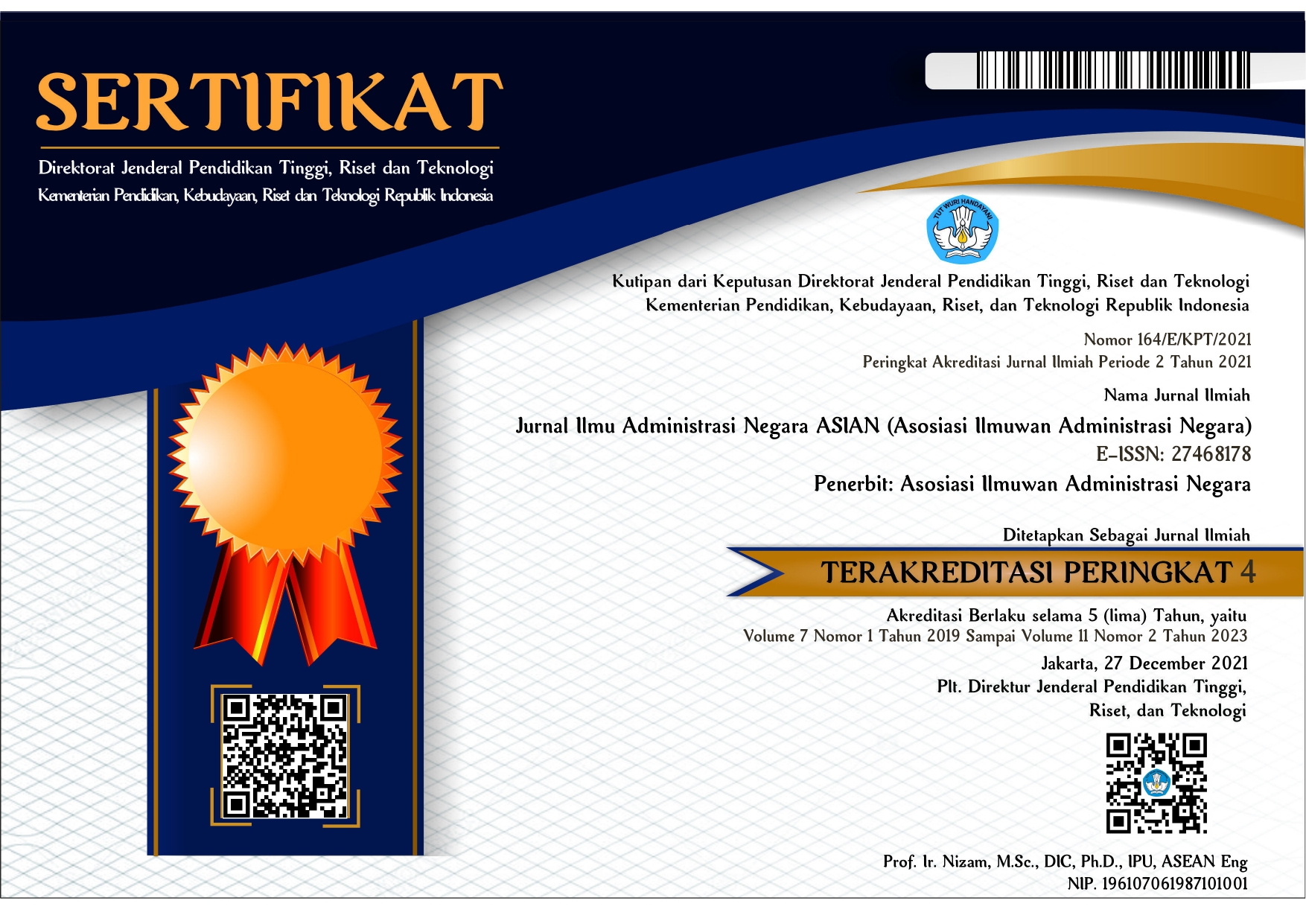Kolaborasi Aktor Dalam Pelaksanaan Kebijakan Program Kota Tanpa Kumuh (Kotaku) di Kecamatan Kasemen Kota Serang
 Abstract views: 964
,
Abstract views: 964
,
 PDF downloads: 1613
PDF downloads: 1613
Abstract
The City Without Slums Program (KOTAKU) is one of the many strategic efforts of the Directorate General of Human Settlements, Ministry of Public Works and Public Housing to assist disaster management in Indonesia and support the “100-0-100 Movement”, namely 100% universal access to drinking water, 0 % collection, and 100% access to proper sanitation. The general objective of this program is to increase access to basic infrastructure and services that are used to support livable, productive, and sustainable use. To achieve achievements in implementing the KOTAKU program, it is necessary to have cooperation or collaboration between the government, the community, and the private sector. Because the role of policy actors greatly determines success in policy formulation, policy implementation considers the consequences of the policies that have been made. Therefore, the purpose of this research is how the collaboration of the actors involved and the role of each actor is. The methodology used in this research is a qualitative method with a descriptive approach carried out through in-depth interviews, observation, and documentation. The results of this study indicate that this program has been implemented optimally, but the results have not been appropriately implemented. The actors who collaborate in the KOTAKU program are DisPERKIM, DPUPR, BAPPEDA, BKM, and the community.
Downloads
References
Ansell, C. (2018). Collaborative platforms as a governance strategy. Journal of Public Administration Research and Theory, 28(1), 16–32. https://doi.org/10.1093/jopart/mux030
Direktorat Jenderal Cipta Karya. (2016). Surat Edaran Jendral Cipta Kerja Nomor 40/SE/DC/2016 Tentang Pedoman Umum Program Kota Tanpa Kumuh (KOTAKU).
Irawan, P., Alfitri, & Saptawan, A. (2019). Jaringan Aktor Dalam Pemberdayaan Masyarakat Pada Program Kota Tanpa Kumuh (KOTAKU) Di Kelurahan Pasar II Kecamatan Prabumulih Utara Kota Prabumulih Provinsi Sumatera Selatan. Jurnal Empirika, 4(1), 1–18. https://doi.org/10.47753/je.v4i1.70
Kotaku.pu.go.id. (2017). Tentang Program Tanpa Kumuh (Kotaku).
Lubis, S. (2007). Kebijakan Publik, Teori & Praktik. Bandung: CV. Mandar Maju.
Maulana, D., & Nugroho, A. (2019). KEBIJAKAN PUBLIK (Cara Mudah Memahami Kebijakan Publik). Serang: CV. AA. Rizky.
Pasolong, H. (2013). Kepemimpinan Birokrasi. Bandung: Alfabeta.
Peraturan Gubernur Banten. (2016). Peraturan Gubernur Banten Nomor 83 Tahun 2016 Tentang Kedudukan, Tugas Pokok, Fungsi, Tipe, Susunan Organisasi dan Tata Kerja Perangkat Daerah Provinsi Banten.
Purba, J. E. A., & Marom, A. (2016). Analisis Peran Aktor Dalam Implementasi Program Kotaku (Kota Tanpa Kumuh) di Kelurahan Bandarharjo Semarang Utara, Kota Semarang. Journal Of Public Policy And Management Review, 10(2), 1–19. https://doi.org/10.14710/jppmr.v10i2.30682
Putri, R., & Rifki. (2019). Program Kotaku Diprioritaskan di Kasemen.
Republik Indonesia. (2014). Peraturan Pemerintah Republik Indonesia Nomor 66 Tahun 2014 Tentang Kesehatan Lingkungan.
Serangkota.go.id. (2019). Pembentukkan Kota Tanpa Kumuh KOTAKU.
Sulaiman, A. L. (2021). Proses Kolaborasi Penanganan Permukiman Kumuh Melalui Program Kota Tanpa Kumuh (Kotaku) di Kota Bandung (Studi Kasus : Kelurahan Tamansari Kecamatan Bandung Wetan). Majalah Media Perencana, 2(1), 1–23.
Sulila, I. (2015). Implementasi Dimensi Pelayanan Publik dalam Konteks Otonomi Daerah. Sleman: Deepublish.
Thomson, A. M. (2006). Collaboration processes: Inside the black box. Public Administration Review. https://doi.org/10.1111/j.1540-6210.2006.00663.x
Copyright (c) 2021 Jurnal Ilmu Administrasi Negara ASIAN (Asosiasi Ilmuwan Administrasi Negara)

This work is licensed under a Creative Commons Attribution-ShareAlike 4.0 International License.
Authors who publish with this journal agree to the following terms:
1. Copyright on any article is retained by the author(s).
2. The author grants the journal, right of first publication with the work simultaneously licensed under a Creative Commons Attribution License that allows others to share the work with an acknowledgment of the work’s authorship and initial publication in this journal.
3. Authors are able to enter into separate, additional contractual arrangements for the non-exclusive distribution of the journal’s published version of the work (e.g., post it to an institutional repository or publish it in a book), with an acknowledgment of its initial publication in this journal.
4. Authors are permitted and encouraged to post their work online (e.g., in institutional repositories or on their website) prior to and during the submission process, as it can lead to productive exchanges, as well as earlier and greater citation of published work.
5. The article and any associated published material is distributed under the Creative Commons Attribution-ShareAlike 4.0 International License








